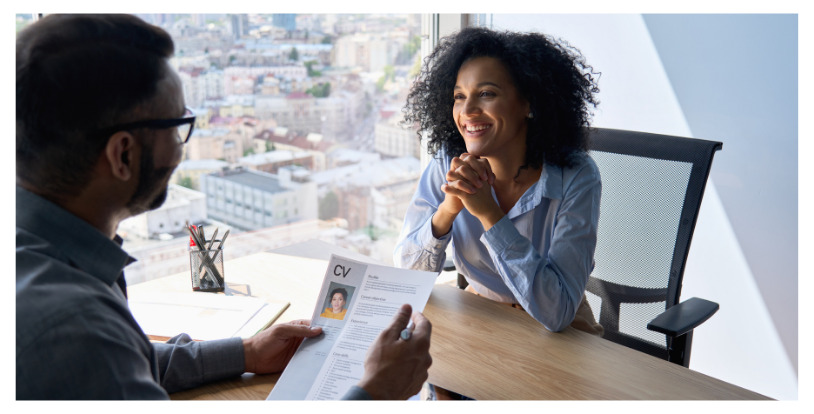Interviews
Summary
Content
Interview
Generally, an interview lasts between 15 minutes and 1 hour. It can be conducted on-site at the company or with online tools (such as Zoom, Microsoft Teams). An interview is an opportunity for the employer to see if the candidate fits the job and company culture. But it is also a good opportunity for the candidate to check if he/she likes the company.
How does a job interview actually work?
- The interview begins and you exchange short sentences with the employer (small talk) to loosen up the conversation.
- The employer introduces himself and the company.
- You introduce yourself and tell something about yourself and your experiences in about 3 minutes (if necessary, you introduce yourself first and then the employer).
- The employer will ask you questions and tell you more about the job and the tasks.
- You can (and even should) ask questions to show interest.
- The interview comes to an end, you can ask more questions and thank the employer.
Job interview experience: 7 tips
- Wear appropriate clothing: Depending on the company culture, dress is more or less regulated. It is best to research the company in advance. As a general rule, dress rather elegantly and professionally. A suit is overdone at most companies, except, for example, in the financial sector.
- Always be on time: It is better to arrive early and wait a few minutes - never keep the other person waiting. And if you are unable to attend or are late for a valid reason, always let them know as early as possible. It may be that the interview will then be postponed.
- Be prepared: Those who are well prepared usually feel less stressed. Being prepared means, above all, understanding the tasks and the job well (and if there are still ambiguities, writing down questions to ask at the interview), researching about the company, making a short self-presentation (see below), and writing down typical interview questions (see below).
- Show curiosity: You will be asked questions. But you are allowed - and even welcome - to ask questions yourself (see below).
- Remain friendly: You may find that you don't get along as well with people in the interview, or that you realize during the interview that you are no longer interested in the job. If this happens, you should still remain friendly. After all, your counterpart has taken time for you.
- Saying thank you: At the beginning of the interview, you should thank them directly for the invitation. At the end you can say again: "Thank you for taking the time. It was an exciting and good interview, I enjoyed meeting you and talking to you about the job and the company."
- Show motivation: It is always good to show your motivation for the job, the tasks as well as the company. As a rule, employers always choose the people who are the most motivated. At the end of the interview, you can also ask (if it has not already been addressed) what the next steps in the application process are.
Typical questions during a job interview
You are welcome to help your refugee prepare for typical interview questions and discuss possible answers. Applicants should expect the following questions:
- Have you arrived safely?
- How are you?
- Tell us something about yourself. What have you done so far?
- Why did you choose this profession? What is your motivation?
- What prerequisites/previous experience do you think you bring to the job?
- Have you applied to any other companies?
- Why do you specifically want to work in our company?
- What are your plans for the future?
- List 3 strengths.
- List 3 weaknesses.
- Why should we take you?
- Do you have any questions?

Confirmation or cancellation
After the application process has been completed, the applicant receives an acceptance or rejection letter from the company. If there is no response, it makes sense to follow up discreetly by phone after about 2 weeks and increases the chances of success. In the event of a rejection: Do not be discouraged, but instead support your refugee esimply support your refugee with his or her next application. If the application is accepted, the applicant will receive an employment contract. This should only be signed after carefulcheck after careful examination. Basic information on employment contracts and employment law is available on this page. this page page.







